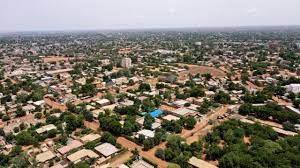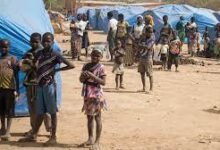
Niger’s military junta has just hours to restore ousted President Mohamed Bazoum to power or face the possibility of military action from the regional bloc Ecowas.
Last Sunday, West African leaders gave the coup leaders a week to comply with its demands or it would “take all measures… [which] may include the use of force”.
But in Niger’s neighbour, Nigeria – where the bulk of the troops are likely to come from – voices against the involvement of the military are growing louder.
The two countries also have close ethnic and historical ties.
On Saturday, Nigeria’s senate urged the government to look at “political and diplomatic options”.
And in the northern Nigerian city of Sokoto, bordering Niger, which is home to the army’s 8 Division, the anxiety is increasing.
It sits on a major junction on the road leading to Niger and is likely to be a mustering point for troops before any military action.
The serenity of Sokoto’s residential neighbourhoods belies the heightened tension in the city and the wider north-western state.
One aspect feeding this is that – according to locals – one in every five residents in Sokoto is from Niger or has connections with the country.
Sokoto city’s sprawling suburb of Sabon-Gari Girafshi is predominantly inhabited by people from Niger. They fear that military intervention by Ecowas could greatly affect their family members and even jeopardise their own security here in Nigeria.
Fifty-one-year-old jewellery maker Sulaiman Ibrahim lives in one of the fenced and gated compounds.
One of his wives and some of his children are in Niger’s capital, Niamey, trapped there because of last month’s coup.
“Now I want to call my wife Fatima to hear from her, because since the day of that coup, I have not heard from her,” he tells the BBC, gripping his phone in his left hand.
He scrolls through his contacts and dials the wife’s number again.
Each call returns with the same message: “The number you are calling is not available at this time.” —BBC






